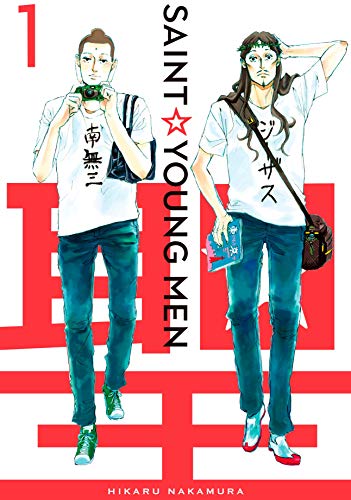By Hikaru Nakamura. Released in Japan as “Saint Onii-san” by Kodansha, serialization ongoing in the magazine Morning Two. Released in North America digitally by Kodansha Comics. Translated by Alethea and Athena Nibley.
Over the past few years, there have been fewer and fewer series that you can point to and say “It’s fantastic, but will never be licensed”. The manga market right now is such that risk-taking can be rewarded, and we’ve been very happy to get things like Captain Harlock, Silver Spoon, and (theoretically) Rose of Versailles. That said, Saint Young Men is a special case. Immensely popular both in Japan and here since its debut in 2006, its basic premise made it seemingly radioactive for a long time, and it was assumed that either the author or the publisher had indicated that it was not the right time for it. But times have changed, and even if it’s only digitally for now, we can all now enjoy the adventures of Jesus Christ and Gautama Buddha living in a small apartment in modern-day Japan and having the time of their afterlives. Having finished the first volume, it’s as fun as advertised.
There’s no real plot to speak of. Each chapter shows us the two leads experiencing something new, be it going to a local pool/sauna, a festival, or (of course) a Buddhist temple. They can both take turns as the boke and tsukkomi, though over the course of the volume Boke Jesus tends to move to the foreground – he’s the more happy go lucky of the two, and doesn’t worry about actual expenses and rent as much as the tighter-wound Buddha. They’re experiencing modern-day Japan, and how they take to it depends very much on what the gag needs to be – sometimes it’s clear they’re fairly new to everything, but then there are the chapters showing us Jesus’ blog, where he reviews all manner of things. Throughout, of course, their character is also informed by their own pasts – we hear about how they both died, and various religious miracles they’ve performed. And the Virgin Mary gets a mention as well. She apparently loves to buy T-shirts.
As you might imagine, there are a lot of obscure references in this volume. The translation is good, but you will find yourself flipping to the endnotes in the back quite a bit. There’s a lot of them – I don’t think I’ve seen so many notes since the days of Sayonara, Zetsubou-sensei. I do hope that this book does eventually get a print edition, because flipping to the back of the book in a digital version can be a pain – on first read, I just let the references wash over me, and read the notes afterwards. Which is fine when it’s discussing sutras and stigmata, but less so when Jesus starts talking about Leah Dizon. That said, one of the first references, which is that Jesus looks a lot like Johnny Depp, works well in both Japanese and English.
This is probably not a series I’m going to be doing full reviews for every time – it’s a slice-of-life comedy with no plot to speak of. But it’s fun, and funny, and you actually do learn quite a bit about Jesus and Buddha – over half the notes are religion-based. If you’ve been waiting forever to read this officially, now is the time to go get it.

